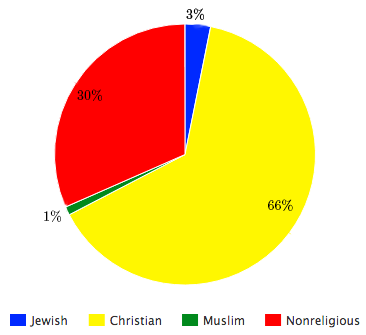Despite more than 60% of students practicing Christianity, DHS should consider minority religions’ holidays
By tess alekseev
“Imagine if Christmas didn’t fall into winter break. People would be outraged,” sophomore Aden Angus said when asked how not getting Jewish holidays off affects him.
It seems unrealistic (because it is), but, just for fun, imagine if it didn’t. Imagine the number of students that would miss school on Christmas, Easter, or other major Christian holidays. In Dexter, it would be a ridiculously large number, easily large enough to cancel school.
So why is it not the same for Jewish and Muslim students?
The answer, of course, is that there isn’t a large amount of those students, at least not enough to disrsupt the overall school day. However, it disrupts the school day of those affected in a major way.
So, how do we fix that?
It seems easy: promote awareness of religious holidays amongst the staff and students. The problem lies in how the school would go about it.
Schools in Ann Arbor utilise a three-star, two-star, one-star model, which dictates importance of the holiday in question.
Three stars denote a major holiday, and teachers may not schedule exams, reviews for exams, tryouts, or dances on those days. Two stars indicate other significant holidays, and students absent during these days are treated as if they had been out sick. One star holidays have no restrictions.
DHS Principal Kit Moran said he encourages his staff to be aware of non-Christian religious holidays, but since Dexter isn’t religiously diverse, it is “fair and reasonable to not know [the holidays]. The star model used by Ann Arbor is admirable, and a good model, but not the right path for Dexter.
“I don’t think there’s been enough need to generate change, but if it were to become a big enough issue to disrupt the school day, we would have to tend to that.”
English teacher Alexander Heidtke is in support of awareness and respect for religious holidays, and their observer’s absence due to them.
“Finding a way to incorporate the non-Christian religious holidays based on inclusiveness, respect, and, at least, awareness, it’s the next step,” he said. “If people know they exist and respect them, then we move forward, in terms of coexisting … It’s hard to bring anything up without offending someone, but sometimes it’s so monumental that you have to offend someone in order to do the right thing.”
It isn’t only hard to move past the prejudice in the school. Another obstacle is the bureaucracy involved in setting up a policy of awareness and respect.
“It’s hard, because religion isn’t commonly brought up, and in Dexter, it isn’t diverse,” history teacher Kevin Cislo said. “It’s easy enough on an individual basis, but a policy is hard because it requires administrative action.”
Yasmin Segev, a DHS senior, is a student who has been negatively affected by the lack of awareness.
“Something I remember, I don’t think it happened this year, but in previous years, was marching band rehearsal landing on the first eve of Rosh Hashanah,” she said. “Rehearsals go from 7:30 to 9 p.m., so it took up the entire eve, and I didn’t get to celebrate with my family.”
When asked about her opinion on collisions between school and religious holiday observance, Segev had a few suggestions for the administration.
“I think that students should be allowed an extension on homework and to not go to after school events, without consequence, if there’s a major holiday for a major religion besides Christianity, at the least,” she said. “A better solution would be not allowing major events to be planned for major holidays in the first place, though.”

